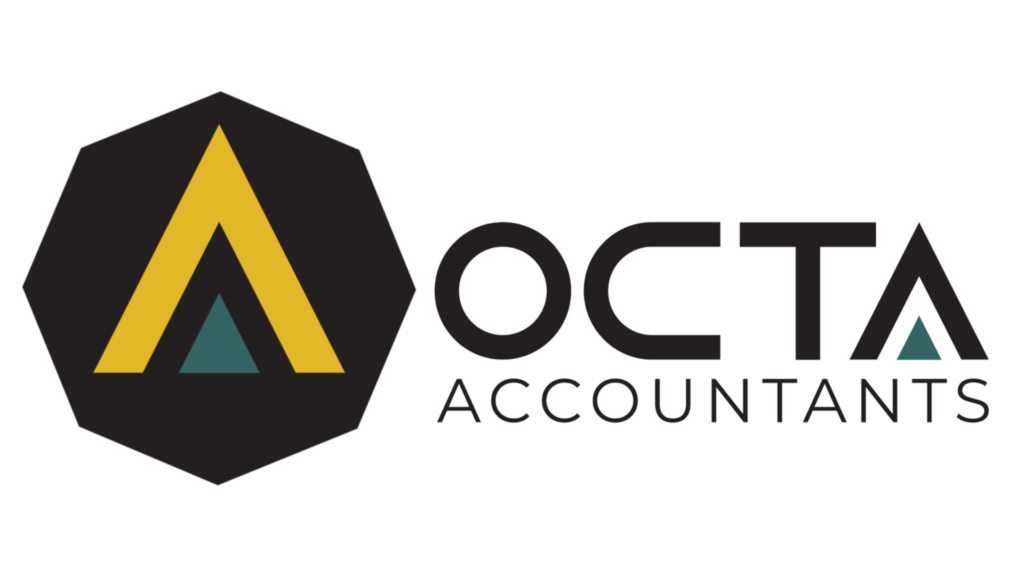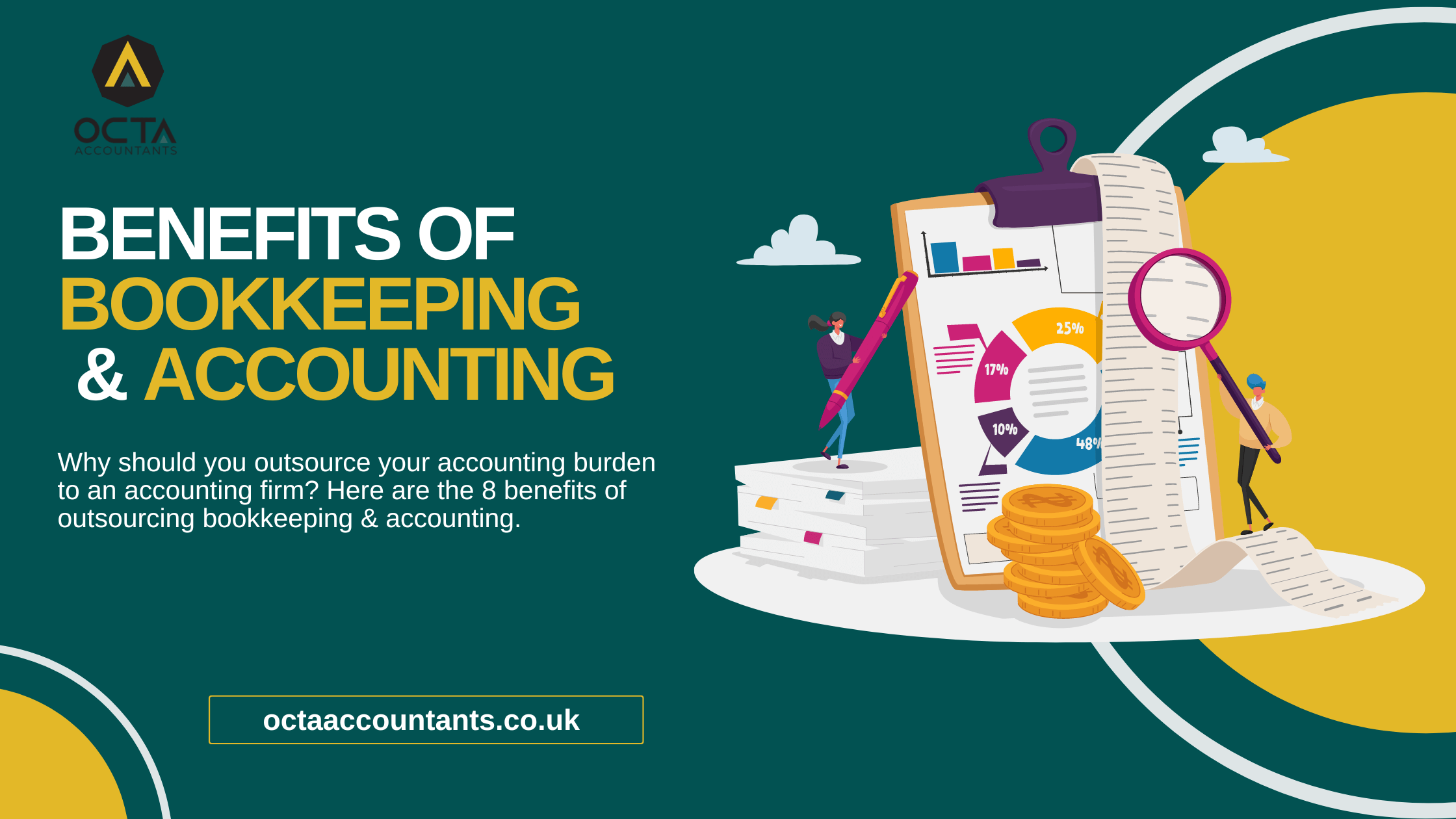Difference between bookkeeping and accounting



Octa Accountants


9 Min Read


May 26, 2023


Accounting & Bookkeeping
Accounting and bookkeeping are two essential components of every business’s operations. Accounting is concerned with the interpretation, analysis, reporting, and summarising of financial data, whereas bookkeeping is limited to recording financial transactions. Both roles assist business owners and CEOs in keeping track of spending, making informed choices, and maybe avoiding significant concerns like fraud and embezzlement. However, there are substantial contrasts between these two sectors, which we shall address here, as well as how each position contributes to business growth and sustainability.
What is Bookkeeping?
Bookkeeping is the systematic process of recording, categorising, and organising a company’s financial transactions. It entails the daily recording of financial transactions such as sales, purchases, receipts, and payments to keep accurate and dependable financial records. Bookkeeping offers crucial data for financial analysis and decision-making and acts as a framework for accounting operations.
Functions of Bookkeeping:
- Keeping Track of Transactions: Bookkeeping’s main function is to record all financial transactions in chronological order. Data such as dates, amounts, accounts involved, and associated descriptions are recorded.
- Determining Transactions: Bookkeepers categorise transactions using a chart of accounts. It facilitates the company’s organisation and summarization of comparable forms of transactions for simpler analysis and reporting.
- Keeping Journals and Ledgers: General ledgers, ledgers of subsidiaries, cash books, sales books, purchase books, and other books of accounts are all maintained by bookkeepers. These records provide an accurate track of financial transactions.
- Accounts Reconciliation: Accounts are reconciled by comparing financial records to external statements such as bank statements to verify accuracy and detect any anomalies.
- Creating Financial Reports: Based on the recorded transactions, bookkeepers create financial reports such as balance sheets, income statements, and cash flow statements. These reports provide an overview of the company’s financial situation and performance.
- Accounts Receivable and Accounts Payable Management: Bookkeepers maintain and manage accounts receivable and accounts payable. It comprises the creation of invoices, the tracking of payments, and the management of outstanding balances.
- Cash Flow Monitoring: Bookkeepers keep records of cash inflows and outflows to monitor and handle the company’s cash position. It also assists in providing adequate cash for everyday tasks, spending management, and planning for future finances.
Also Read: What is included in bookkeeping? And how it helps a business?
Roles in Bookkeeping:
1) Bookkeeper
A bookkeeper is responsible for performing day-to-day bookkeeping tasks. They record transactions, maintain financial records, reconcile accounts, and generate reports. Bookkeepers ensure the accuracy and completeness of financial data.
2) Accounting Clerk
In some organisations, bookkeeping functions may be handled by accounting clerks. They assist in recording transactions, managing accounts, and maintaining financial records under the guidance of a senior bookkeeper or accountant.
What is Accounting?
Accounting is a broader discipline that encompasses bookkeeping and extends beyond the basic recording and organising of financial transactions. While bookkeeping focuses on the systematic recording of financial data, accounting involves interpreting, analysing, summarising, and reporting financial information to stakeholders for decision-making purposes.
Functions of Accounting:
- Financial reporting statements: Accounting’s substantial obligation is to develop and present financial statements such as the income statement, balance sheet, and cash flow statement. These reports provide an overview of a company’s fiscal health, position, and cash flows.
- Analysis and Interpretation: Accounting involves the analysis and interpretation of financial data to evaluate the financial health and performance of a business. This includes assessing profitability, liquidity, solvency, and efficiency ratios, as well as identifying trends and patterns that can help in making informed business decisions.
- Budgeting and Planning: Accounting plays an essential role in budgeting and planning operations. It includes creating and monitoring budgets, financial forecasts, and projections to assist organisations in setting goals, allocating resources, and tracking progress towards financial targets.
- Risk management and internal control: Accounting systems and processes assist in the establishment of internal controls to protect assets, prevent fraud, and assure compliance with laws and regulations. It includes developing and carrying out controls, conducting internal audits, and identifying and reducing financial risks.
- Tax Compliance: Accounting ensures tax conformity by accurately recording and reporting revenue, spending, and other pertinent financial information. It entails calculating and paying taxes, preparing tax returns, and connecting with tax authorities.
- Making a Decision: Accounting provides significant financial information and analysis to help decision-makers across all levels of a company. It includes examining investment prospects, project profitability, pricing tactics, and making strategic business decisions.
Roles of Accountants:
1) Financial Accountant
Financial accountants are responsible for preparing financial statements, analysing financial data, and ensuring compliance with accounting standards and regulations.
2) Management Accountant
Management accountants focus on providing financial information and analysis to support internal decision-making. They assist in budgeting, cost analysis, performance evaluation, and strategic planning.
3) Tax Accountant
Tax accountants specialise in tax compliance and planning. They ensure accurate tax reporting, minimise tax liabilities, and provide guidance on tax-related matters.
4) Auditor
Auditors conduct independent reviews and assessments of financial records to ensure accuracy, compliance, and internal control effectiveness.
5) Financial Analyst
Financial analysts analyse financial data, market trends, and economic factors to provide insights and recommendations for investment decisions, portfolio management, and financial planning.
Also Read: Outsource accounting services in the UK – When, Why, & How?
8 Major differences between bookkeeping and accounting
Here are the eight major differences between bookkeeping and accounting in detail:
1) Function and Scope:
Bookkeeping is the systematic recording, classifying, and organising of financial transactions. Accounting encompasses bookkeeping and extends beyond it, involving the analysis, interpretation, summarization, and communication of financial information to support decision-making. Accountants analyse financial data, prepare financial reports, perform financial forecasting, provide financial advice, and ensure compliance with accounting principles and regulations.
2) Depth of Detail:
Bookkeeping is the systematic recording, classifying, and organising of financial transactions. Accounting encompasses bookkeeping and extends beyond it, involving the analysis, interpretation, summarization, and communication of financial information to support decision-making. Accountants analyse financial data, prepare financial reports, perform financial forecasting, provide financial advice, and ensure compliance with accounting principles and regulations.
3) Interpretation and Analysis:
Bookkeeping does not involve in-depth analysis or interpretation of financial data. Its primary goal is to ensure accurate record-keeping and provide the foundation for accounting processes. Accounting involves analysing financial data to gain insights into the financial health of a business. Accountants interpret financial information, identify trends, calculate ratios and financial indicators, and provide meaningful analysis to stakeholders for decision-making purposes.
4) Decision-Making Support:
Bookkeeping does not directly influence decision-making. Its duty is to supply accountants with precise and dependable financial data for use in decision-making processes. Accounting is critical in decision-making. Accountants use financial data and analysis to generate insights, recommendations, and projections that help in the development of strategic plans, budgeting, investment decisions, and performance evaluation.
5) Regulation and Compliance:
Bookkeeping is concerned with recording financial transactions accurately and in accordance with accounting principles and rules. It assures that the financial records are complete, well-organised, and ready to be used in subsequent accounting operations. Accounting comprises operations such as financial reporting, tax planning, and guaranteeing adherence to legal requirements and industry-specific rules, in addition to compliance with accounting standards and regulations.
6) Expertise Level:
Bookkeepers can handle bookkeeping activities because they have an in-depth knowledge of basic accounting principles and are skilled at recording financial transactions. Accounting necessitates a greater level of skill and knowledge. Accountants usually have a formal education in accounting or finance and a thorough understanding of accounting principles, financial analysis methodologies, and reporting requirements.
7) Responsibilities and Roles:
Bookkeepers are responsible for documenting financial activities, keeping journals and ledgers, balancing accounts, producing invoices, and processing payroll. They are essential for the accuracy and integrity of financial data. Accountants are accountable for a broader spectrum of tasks. They assess financial data, generate financial statements, offer financial advice, manage budgets, undertake cost analyses, analyse investment opportunities, and maintain compliance with accounting standards and regulations.
8) Duration:
Bookkeeping entails the accurate and perpetual recording of financial transactions. It is concerned with keeping correct and current records on a daily basis. Accounting is often characterised by periodic reporting and analysis. It entails the monthly, quarterly, or annual preparation of financial statements such as income statements, balance sheets, and cash flow statements.
Also Read: 8 Benefits of Outsourcing Bookkeeping & Accounting
When to hire a bookkeeper?
If you find yourself spending too much time on bookkeeping tasks instead of enough time on essential business activities, hire a bookkeeper. To make proficient business decisions and preserve financial transparency, you need accurate and error-free financial records. Your company is growing, and the volume of financial transactions is rising, which makes bookkeeping roles tough to manage on your own. Hiring a bookkeeper can relieve the burden of bookkeeping tasks while also providing significant financial insights, allowing you to take informed decisions and propel your company ahead.
When to hire an accountant?
Hiring an accountant is imperative for businesses that engage in complex financial transactions, require help in developing long-term financial plans, forecasting cash flow, and analysing financial data, are subject to an audit, and are experiencing rapid growth, expansion into new markets, or significant changes. An accountant may give specialised financial knowledge, maintain regulatory compliance, and provide vital insights into a company’s financial health and growth prospects. They can also assist in making informed choices, streamlining financial processes, and driving the company’s overall success.
Hire a bookkeeper and an accountant with Octa Accountants!
Octa Accountants‘ bookkeeping and accounting services allow you to concentrate on establishing your company. Work on growing your business while we manage your books, accounts, payroll, tax, and other responsibilities. Outsourcing your accounting and bookkeeping services to an outside company reduces on-site administrative costs and saves time. A devoted and skilled accountant also oversees your company’s finances so that nothing goes wrong. You now have more time to develop plans and expand your firm. For an effortless experience, choose an expert accountant in the UK from Octa Accounts.
About Us
Octa Accountants is a one-stop accounting firm that offers a wide range of finance management services.
Our Blogs
8 Benefits of Outsourcing Bookkeeping and Accounting
8 Benefits of Outsourcing Bookkeeping and Accounting Octa Accountants 5 Min Read Nov 22, 2022 Bookkeeping & Accounting In today’s world, businesses find it taxing to hire an accountant at an affordable rate who keeps a record of all financial operations and manages all bank operations. For this reason, businesses prefer to outsource bookkeeping and […]
How To Register a Company in the UK?
How To Register a Company in the UK? Octa Accountants 8 Min Read Nov 19, 2022 Company Incorporation Registering your company is a legal obligation before starting a business in the UK. Companies House is the regulating authority and has the right to approve or reject your request. When your application is approved, you will […]
How to Register for VAT?
How to Register for VAT in the UK? Octa Accountants 11 Min Read Dec 15, 2022 VAT Registration VAT or value-added tax is a payable amount on most products and services in the UK. Although customers pay the tax while making a purchase, businesses (that earn over a specific threshold) have to charge it and […]



